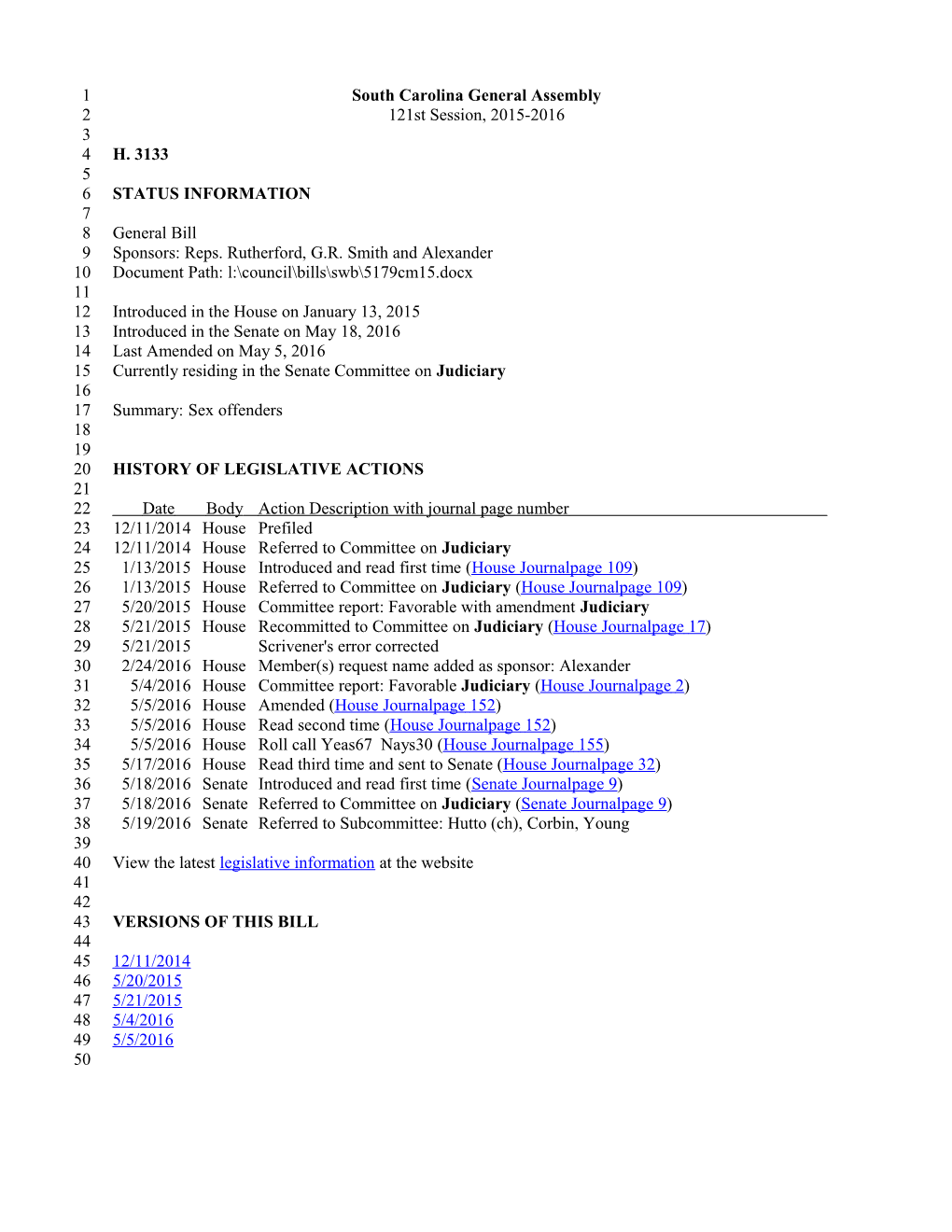South Carolina General Assembly
121st Session, 2015-2016
H. 3133
STATUS INFORMATION
General Bill
Sponsors: Reps. Rutherford, G.R.Smith and Alexander
Document Path: l:\council\bills\swb\5179cm15.docx
Introduced in the House on January 13, 2015
Introduced in the Senate on May 18, 2016
Last Amended on May 5, 2016
Currently residing in the Senate Committee on Judiciary
Summary: Sex offenders
HISTORY OF LEGISLATIVE ACTIONS
DateBodyAction Description with journal page number
12/11/2014HousePrefiled
12/11/2014HouseReferred to Committee on Judiciary
1/13/2015HouseIntroduced and read first time (House Journalpage109)
1/13/2015HouseReferred to Committee on Judiciary(House Journalpage109)
5/20/2015HouseCommittee report: Favorable with amendment Judiciary
5/21/2015HouseRecommitted to Committee on Judiciary(House Journalpage17)
5/21/2015Scrivener's error corrected
2/24/2016HouseMember(s) request name added as sponsor: Alexander
5/4/2016HouseCommittee report: Favorable Judiciary(House Journalpage2)
5/5/2016HouseAmended (House Journalpage152)
5/5/2016HouseRead second time (House Journalpage152)
5/5/2016HouseRoll call Yeas67 Nays30 (House Journalpage155)
5/17/2016HouseRead third time and sent to Senate (House Journalpage32)
5/18/2016SenateIntroduced and read first time (Senate Journalpage9)
5/18/2016SenateReferred to Committee on Judiciary(Senate Journalpage9)
5/19/2016SenateReferred to Subcommittee: Hutto (ch), Corbin, Young
View the latest legislative information at the website
VERSIONS OF THIS BILL
12/11/2014
5/20/2015
5/21/2015
5/4/2016
5/5/2016
AMENDED
May 5, 2016
H.3133
Introduced by Reps. Rutherford, G.R.Smith and Alexander
S. Printed 5/5/16--H.
Read the first time January 13, 2015.
[3133-1]
ABILL
TO AMEND THE CODE OF LAWS OF SOUTH CAROLINA, 1976, BY ADDING SECTION 233462 SO AS TO PROVIDE THAT A COUNTY SOLICITOR MUST PETITION THE FAMILY COURT TO REQUIRE A PERSON TO CONTINUE TO REGISTER AS A SEX OFFENDER WHO IS A REGISTERED JUVENILE SEX OFFENDER, WHO IS AT LEAST TWENTYONE YEARS OF AGE, OR HAS BEEN RELEASED FROM THE CUSTODY OF THE DEPARTMENT OF JUVENILE JUSTICE, TO PROVIDE THAT THE PERSON MUST CONTINUE TO REGISTER AS A SEX OFFENDER IF THE FAMILY COURT DETERMINES THAT HE IS LIKELY TO OR POSES AN ONGOING THREAT TO THE PUBLIC, AND TO PROVIDE THAT IF NO PETITION IS FILED WITHIN NINETY DAYS FOLLOWING THE TWENTYFIRST BIRTHDAY OF THE PERSON OR THE DATE OF HIS RELEASE FROM CUSTODY, OR IF THE FAMILY COURT DETERMINES THAT THE PERSON IS NOT LIKELY TO OR DOES NOT POSE A THREAT TO THE PUBLIC, THEN THE PERSON IS NO LONGER REQUIRED TO REGISTER AS A SEX OFFENDER AND HIS INFORMATION MUST BE DELETED FROM THE SEX OFFENDER REGISTRY.
Amend Title To Conform
Be it enacted by the General Assembly of the State of South Carolina:
SECTION1.Article 7, Chapter 3, Title 23 of the 1976 Code is amended by adding:
“Section 233462.(A)When a registered juvenile sex offender reaches twentyone years of age and is released from the custody of the Department of Juvenile Justice, South Carolina Department of Corrections, or South Carolina Probation, Parole, and Pardon Services, the person may petition the family court to remove the person’s requirement to register as a sex offender. In the first year after this section takes effect, the Family Court is limited to hearing only one petition each month. If the Family Court determines at a hearing that the person who is registered as a juvenile sex offender is likely to or does pose an ongoing serious or aggressive threat to the public, the court shall order that the delinquent act be deemed an adult criminal conviction for the purpose of registration, notification, and public information access pursuant to Article 7, Chapter 3, Title 23. If the Family Court determines the person is not likely to or does not pose an ongoing serious or aggressive threat to the public, the juvenile is no longer required to register as a sex offender and his information must be deleted from the sex offender registry. The Attorney General or Circuit Solicitor shall have the right to be heard and the right to have the person assessed. The burden of proof is on the petitioner which must be proven by clear and convincing evidence. The court shall have the discretion to order treatment or any other relevant items as a condition of removal. The petitioner cannot reapply for three years if denied unless otherwise ordered by the court.
In considering the petition, the court shall consider:
(1)the likelihood the petitioner will reoffend, based on a risk assessment or an evaluation by a mental health professional, the cost of which shall be borne by the petitioner unless the petitioner is indigent;
(2)the age of the petitioner at the time of the offense;
(3)mitigating factors, including whether the petitioner has completed any treatment programs;
(4)aggravating factors including, but not limited to, use of force or weapons;
(5)any assessments of the person performed at the request of the Attorney General or Circuit Solicitor; and
(6)other factors the court considers relevant.
(B)Notwithstanding Section 23-3-430, a child thirteen years of age or older who has been adjudicated delinquent by a family court in this State for an offense described in Section 23-3-430, with the exception of Sections 163652, 163653, 163654 and Section 163656 when the assault was with the intent to commit, Sections 163652, 163653, and 163654 which require mandatory sex offender registration, may be required to register pursuant to the provisions of this article. The family court shall use its discretion to determine whether a juvenile is placed on the sex offender registry and required to comply with registration requirements. The determination to place the juvenile on the sex offender registry may be after adjudication and held in abeyance until a sex offender treatment program is completed. In making this determination, the court shall consider:
(1)the likelihood the juvenile will reoffend, based on a psychosexual risk assessment and evaluation by a licensed clinical psychologist or licensed psychiatrist employed by the Department of Juvenile Justice. The Circuit Solicitor’s Office, Attorney General’s Office, or the juvenile also may have an independent psychosexual risk assessment evaluation by a licensed psychologist or psychiatrist;
(2)the age of the juvenile at the time of the offense;
(3)mitigating factors;
(4)aggravating factors including, but not limited to, use of force or weapons;
(5)prior adjudications; and
(6)other factors the court considers relevant.”
SECTION2.This act takes effect upon approval by the Governor.
XX
[3133]1
